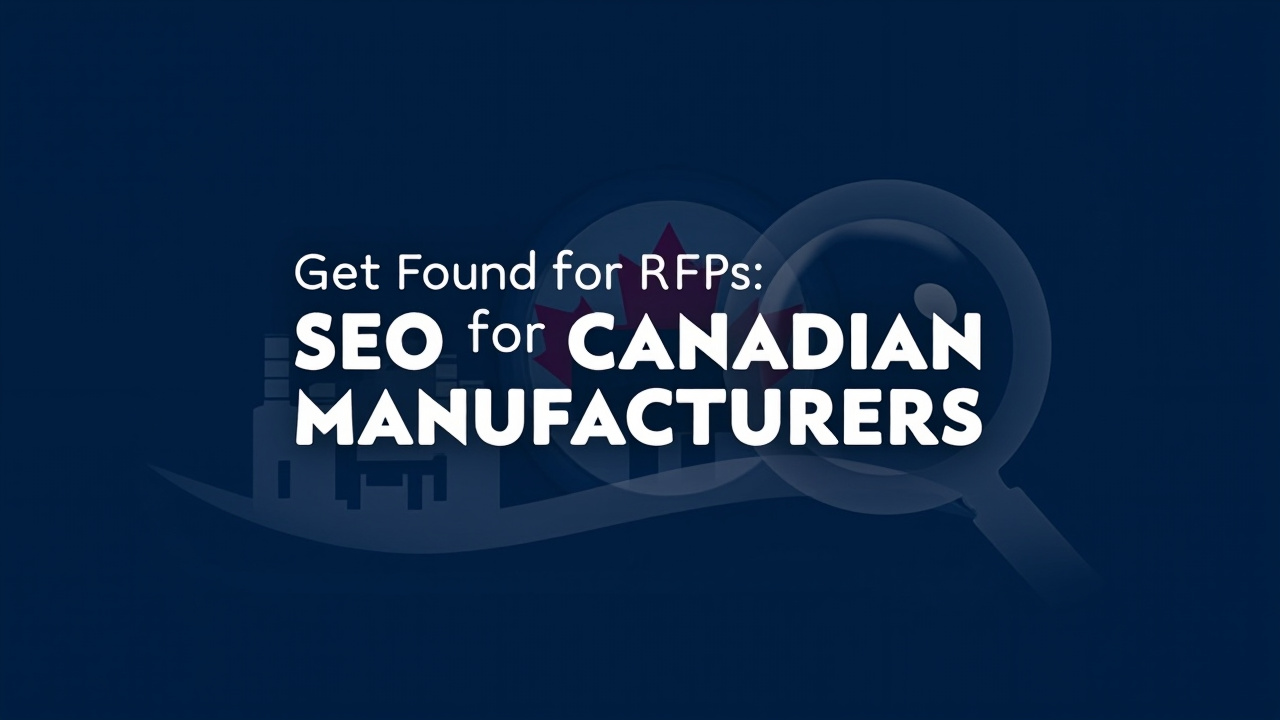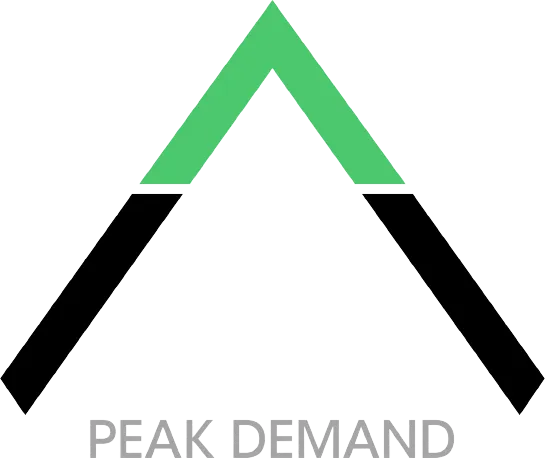AI Agency Digital Automation Services
Toronto, Ontario, Canada
Let's climb to the top of your market, one custom automation at a time.
Phone: +1 (647) 691-0082
Email: sasha@info.peakdemand.ca
Automated Voice AI Call Centre Using AI Agents with Personality
Agents that Work 24/7 - No Hold Times
Dedicated Phone Numbers
Speak to Multiple Customers
Speak in Multiple Languages
Customized Personality and Accents
Trained On Any Service or Document
Book Appointments Onto Calendars
Update CRM After Data Extraction
Provide Post Call Reports
Never Take Breaks
Never Get Tired
Never Retire
Customer Service Operations, Technical Support, Sales, After Hours
AI News, AI Updates, AI Guides

SEO for Canadian Manufacturers: Get Found for Government RFPs & Public Sector Bids
If you're a manufacturing company in Canada bidding on government contracts—or thinking about it—you already know the competition is fierce. But here's the secret many miss: the teams researching vendors and evaluating proposals often use tools like Google and ChatGPT to vet companies before the RFP is even issued. That means if your business doesn’t show up in the right places, with the right signals, you might never even make the shortlist.
In this guide, we’ll show you how AI-driven SEO, NAICS keyword targeting, and schema optimization can position your manufacturing company as the go-to choice for public sector buyers—long before the bidding even begins.
Why SEO Matters for Canadian Manufacturers Bidding on Government RFPs

Most manufacturers focus on bid writing, certifications, and pricing—but forget the digital front door: search visibility. Government agencies and procurement teams increasingly rely on Google, ChatGPT, and online vendor databases to research qualified suppliers. If your company doesn't rank or appear in these channels, you're at a disadvantage.
Here’s why SEO is critical in the RFP world:
Early Discovery: Public procurement officers often search online for potential vendors before an RFP is released. A strong SEO presence means your company shows up in those searches.
Credibility Signals: Websites with clear services, certifications, NAICS codes, and past project experience build trust and legitimacy.
AI Visibility: Tools like ChatGPT surface businesses with optimized, structured content. If your digital footprint is weak, you’re invisible to these AI tools.
By optimizing your content and structure for search engines and AI models, you help decision-makers find you, trust you, and shortlist you—before they even read your proposal.
How Public Sector Teams Use Google and ChatGPT to Find Vendors

Procurement officers don’t just rely on posted bids—they use search engines and AI tools like ChatGPT to discover new suppliers, verify credentials, and assess legitimacy.
Here’s how they typically use online tools:
Google Searches for Pre-Qualification: Teams search “Canadian metal fabrication suppliers with ISO certification” or “industrial HVAC vendors with government experience” to pre-screen vendors.
ChatGPT for Vendor Shortlists: When asking ChatGPT “Who supplies custom enclosures for transit infrastructure in Ontario?”—the model pulls from indexed web content and known vendor listings.
Backlink & Citation Checks: Government evaluators often verify your presence on trusted directories, trade associations, and past project mentions in press releases or industry media.
If your manufacturing business doesn’t have SEO-optimized content aligned with these queries—or doesn’t show up when someone checks your name—your chances of being shortlisted plummet.
Modern procurement is digital-first. Being visible in these early research phases is just as critical as what’s in your final bid.
Optimizing for RFP-Relevant Keywords & NAICS Codes

When procurement officials look for vendors, they often use specific terms tied to public bidding, certifications, and industry classifications. That’s why targeting the right keywords is essential for visibility.
Include RFP-Specific Terminology in Your Website Content:
“Request for Proposal (RFP)”
“Public procurement”
“Government vendor”
“Infrastructure bid response”
“Compliant supplier Canada”
Embed Your NAICS Code Strategically:
Include your primary NAICS (North American Industry Classification System) codes on your homepage, footer, and About/Capabilities pages. These help government searchers (and AI tools) quickly identify your specialization.
Example:
“As a certified 332312 sheet metal fabrication company (NAICS), we provide infrastructure-ready components for transportation and public works projects.”
Create Content That Speaks to the Public Sector Buyer:
Highlight your experience with municipal, provincial, or federal clients.
Showcase safety certifications, compliance protocols, and delivery capabilities.
Use headings like “Government Procurement Experience” or “Certified Vendor for Canadian Infrastructure Projects.”
Why It Works:
SEO isn’t just about ranking high—it’s about showing procurement teams (and tools like ChatGPT) that your business matches their exact needs, in their language.
Add Schema Markup to Show Certifications, Services & Service Areas

What Is Schema Markup?
Schema markup is a type of structured data added to your website’s code. It helps search engines and AI tools like ChatGPT better understand what your business does, what services you offer, where you operate, and which certifications you hold. Think of it as giving Google and AI a cheat sheet on how to interpret your website.
Without schema, your content is just text. With schema, your content becomes categorized, contextualized, and far more visible across AI-powered platforms.
Use These Schema Types for Manufacturing RFP Visibility:
OrganizationorLocalBusiness: Add business name, logo, contact details, and geographic service area.Product: Tag any major manufactured goods or specialized offerings.Service: Define capabilities like shipping, installation, or customization.GovernmentService(if applicable): Highlight if you serve the public sector directly.Certification(usinghasCredentialoraward): Call out ISO, CSA, or industry-recognized certifications.AreaServed: List specific provinces, cities, or national scope of your operations.
Why This Matters
When public buyers or procurement agents search for suppliers—or when they use ChatGPT to ask about certified vendors in a specific location—schema helps ensure your company is recognized and recommended as a relevant, legitimate option.
Build RFP-Specific Landing Pages That Rank and Convert

If your manufacturing company wants to get found for government or large infrastructure RFPs, having general product pages won’t cut it. You need dedicated landing pages that speak directly to the procurement process.
What Should Be on These Pages?
Industry & Capability Focus:
Make it clear what sectors you serve—construction, utilities, public infrastructure, defense, etc.—and the exact products or services you deliver.Certifications & Compliance:
List all relevant standards (e.g., ISO 9001, CSA, COR), safety credentials, and regulatory compliance info prominently. These are trust signals for RFP reviewers and AI alike.NAICS & Government Keywords:
Include National Industry Classification Codes (NAICS), procurement language (e.g., “qualified vendor,” “bidder registration”), and city/province targeting for local contracts.Quote or Bid CTA:
Use clear calls-to-action like “Request Prequalification Package,” “Get a Custom Quote,” or “View Our Past Government Contracts” to drive lead generation.Schema Markup:
As mentioned earlier, apply structured data to these pages using schema types likeProduct,Organization, andServiceto make the page AI-readable and search-friendly.
Bonus Tip:
If you’ve responded to past RFPs or have experience working with government or institutional buyers, create a “Procurement Experience” section. This helps you show proof of performance without revealing confidential client data.
Mention Government Clients, Procurement Experience & Capabilities

When it comes to RFP visibility—both in Google search and through ChatGPT-style AI recommendations—trust and proof of experience go a long way.
If your manufacturing company has previously served:
Municipalities
Provincial ministries
Federal departments
Crown corporations
Public infrastructure projects
…mention them on your website (where permissible). You don’t need to name every agency, but phrases like “Trusted by government and institutional buyers across Canada” go a long way for SEO and authority-building.
What to Include:
Client Types or Categories:
List industries and sectors you've served, such as healthcare infrastructure, transit systems, clean energy projects, or municipal utilities.Contract Types:
Describe past work as a subcontractor, vendor of record, or sole-source supplier for projects funded by government or public-private partnerships.Project Scope:
Share size, scale, and type of deliverables (e.g., “Delivered 10,000 linear feet of modular steel framing for publicly funded transportation depots”).Prequalification or Vendor Status:
Mention if you're already a prequalified vendor in any jurisdictions—this is highly relevant to RFP evaluators and helps you rank for related queries.
By showcasing your track record and capacity to deliver on complex, regulated projects, you increase the trustworthiness of your pages and improve your chance of being found and shortlisted—whether by a human reviewer or an AI assistant summarizing your capabilities.
Get Local SEO Right: Be Findable in Your Province and Region

Many government RFPs, especially at the municipal and provincial levels, prioritize local or regional vendors. Even federally funded infrastructure projects often include regional requirements for bid eligibility or supplier preference.
That’s why local SEO isn’t just a nice-to-have—it’s critical for visibility in public procurement ecosystems.
Key Tactics to Strengthen Local SEO:
Dedicated Location Pages
Create service or manufacturing pages tailored to each region you serve—e.g., “Metal Fabrication for Alberta Infrastructure Projects” or “Modular Components Supplier in Ontario.”Google Business Profile Optimization
Ensure your listing is fully optimized with correct categories, service areas, keywords, and up-to-date contact info.Local Backlinks
Seek backlinks from local directories, industry associations, trade schools, and chambers of commerce in your target regions.NAP Consistency (Name, Address, Phone)
Ensure identical contact details across your website, listings, and citations. Inconsistent NAP data hurts your trust signals.Map Pack Visibility
Appear in Google’s “map pack” for relevant local searches like “infrastructure steel supplier Calgary” or “HVAC vendor for hospitals Toronto.” These placements matter for both human and AI-assisted search discovery.
Why This Matters for RFP Leads:
Government buyers may be searching for region-specific suppliers with terms like:
“prequalified contractors Alberta”
“Ontario manufacturers for RFP”
“public procurement vendors British Columbia”
When your pages and metadata reflect regional serviceability and include localized keywords, your business is more likely to be surfaced—whether on Google or via ChatGPT-like tools referencing regional context.
Build Out Trust Signals: Certifications, Compliance & Capacity

To win government RFPs, manufacturers need more than just SEO visibility—they need credibility. Procurement officers and AI systems alike look for proof that your company can handle large-scale, regulated, or high-stakes contracts. That proof needs to be clearly visible on your website.
Key Trust-Building Elements to Include:
Certifications and Standards
ISO 9001, CSA, LEED, GMP, or sector-specific credentials.
Add them to a dedicated “Certifications” or “Compliance” page, and mention them contextually throughout service pages.
Government Experience or Case Studies
Showcase any completed RFP projects or supplier contracts you've won in the past.
Include details like scope, client (if public), region, and outcomes.
Safety and Environmental Compliance
Clearly display policies and adherence to safety, workplace, and sustainability regulations (e.g., COR, WSIB, environmental reports).
NAICS & Industry Codes
Add a section where you list your NAICS codes and relevant industry classifications. This not only helps buyers but also improves semantic SEO.
Team & Equipment Capacity
Include detailed breakdowns of your manufacturing capabilities, locations, and technologies. Many RFPs are awarded based on demonstrated scalability.
Why This Matters for Visibility:
Procurement teams and the AI tools they increasingly rely on are trained to scan for signs of eligibility, reliability, and compliance. By surfacing these credentials, schema-tagging them, and aligning them with RFP-related content, your website becomes more likely to:
Rank for compliance-related searches
Be surfaced by LLMs like ChatGPT as a credible vendor
Convert visitors into bid inquiries or scheduled calls
Want More Visibility for RFPs? Book an SEO Strategy Call

If you're a Canadian manufacturer bidding on public or private RFPs and you're not showing up in searches—or worse, not appearing in ChatGPT suggestions—your digital visibility is costing you contracts.
At Peak Demand, we help manufacturers:
Rank for procurement-ready keywords like metal fabrication RFP Ontario or custom machining supplier Canada
Implement RFP schema and trust-building markup
Optimize site content to align with ChatGPT and AI-assisted vendor discovery
Build localized SEO that puts your facility on the radar of regional buyers
You don’t need to guess. You need a clear plan, powered by AI SEO strategies built specifically for industrial and government-facing businesses.
✅ Book a discovery call now to see where your gaps are and how we can help you get found, qualified, and contacted—by both procurement teams and the AI systems they’re using to search.
Frequently Asked Questions: SEO for Canadian Manufacturing Bidders to Win More RFP Contracts and Get Found by Procurement Teams & ChatGPT
Q: What’s the connection between SEO and getting government RFPs?
A: Many procurement teams use search engines—or now ChatGPT—to research vendors. If your site doesn’t rank for the right terms, you’re invisible. SEO ensures your manufacturing business appears in searches related to public tenders, certifications, and NAICS-aligned services.
Q: What is RFP schema markup and why does it matter?
A: RFP schema is structured data added to your site code that signals bid opportunities or your qualifications for them. It helps search engines understand and index your RFP-related content more accurately—boosting visibility in both Google and AI tools.
Q: How can Canadian manufacturers use SEO to win more contracts?
A: By optimizing service pages with procurement language, adding location-based keywords (like “Ontario industrial fabrication”), and ensuring your certifications and capabilities are clearly indexed, you increase your chances of being shortlisted by buyers doing online research.
Q: Does ChatGPT really recommend vendors based on SEO?
A: Yes. ChatGPT doesn’t crawl the web live—it references indexed content. If your website is optimized with strong SEO, schema, and clear service signals, ChatGPT is more likely to surface your brand when buyers ask about vendor options.
Q: What keywords should manufacturers target for public RFP SEO?
A: Keywords like “RFQ for [your product] Canada,” “government supplier [industry],” “NAICS [code] vendor,” or “bid-ready manufacturer Ontario” are valuable. Your site should include variations of these across product pages, capabilities statements, and blog content.
Q: How is SEO different for public sector vs. B2B leads?
A: B2B SEO often targets decision-makers within companies, while public sector SEO must align with procurement portals, certification requirements, and legal tendering terminology. Schema and trust signals like ISO, Controlled Goods, or ITB alignment matter more.
Q: What if we already bid on RFPs but get no inbound traffic?
A: Then your digital presence isn’t working for you. An SEO audit can reveal missing schema, poor keyword alignment, weak backlink profiles, or technical site issues that prevent procurement teams—or AI models—from ever finding your business.
Q: How can I tell if our site is visible to ChatGPT or AI assistants?
A: Start by asking ChatGPT questions a procurement officer might type. If your business doesn’t appear—or any businesses in your category don’t—you likely need stronger SEO and clearer content architecture.
Q: What’s included in an AI SEO audit for manufacturers?
A: We look at your technical SEO health, RFP visibility, keyword performance, schema markup, local and industry-specific citations, and AI alignment. The result: a clear roadmap to help your company rank better and get found more often.
Q: How do we get started with an SEO strategy for RFP visibility?
A: Book a free discovery call with our team. We’ll assess your current digital footprint and show you how SEO, schema, and AI-readiness can put your manufacturing business in front of the right buyers—public or private.
Learn more about the technology we employ.

At Peak Demand AI Agency and AI RFP vendor, we support RFP-driven organizations—like manufacturers, infrastructure firms, and B2B service providers—by helping them get discovered by procurement teams actively seeking qualified vendors. Our 24/7 Voice AI receptionists capture every inbound inquiry, answer key questions, qualify leads, and book appointments—ensuring you never miss a government or enterprise opportunity. When paired with our turnkey SEO services and organic lead generation systems, your company shows up in ChatGPT, Google, and sourcing platforms right when decision-makers are researching RFP vendors. Because in competitive bidding, visibility and responsiveness aren’t optional—they’re how you win.
AI Agency Digital Marketing Services Toronto, Ontario, Canada
AI Guided Website Design
Our AI-driven studio builds lean, conversion-first websites—no flash, just function. We strip away the clutter and use data-backed layouts, clear CTAs, and continuous optimization to turn visitors into customers. You stay focused on growth; we make your site your top lead generator.
AI Driven SEO Services
Our AI-powered SEO services zero in on high-intent keywords and technical precision to secure top rankings, attract targeted organic traffic, and convert visitors into qualified leads—so your website works smarter, not louder.
AI Personalized Email Marketing
Our AI-driven platform crafts hyper-personalized messaging using your custom business data points and each customer’s unique journey—so every touch feels relevant, timely, and drives real engagement.
AI Automation
Our AI-driven automation suite—including intelligent voice agents—makes real-time decisions to streamline your entire workflow. Voice agents handle inbound calls, route requests, and trigger follow-up actions, while our backend automation manages task handoffs, exception escalations, and data sync. You save valuable time and boost efficiency, letting you focus on what matters most as our intelligent solutions propel your business forward.
AI Powered Chatbots
Our AI-driven chatbots are available 24/7 across every channel—website widget, SMS, email, voice agents, and social media. They instantly answer questions, capture leads, and boost customer satisfaction with seamless, efficient interactions that never sleep.
AI Powered Voice Agents & Call Centre Services
Our SOC 2-, HIPAA-, and PIPEDA-compliant AI voice agents elevate your call center operations—delivering 24/7 customer service (including after-hours) across every channel, from website widget to SMS, email, social media, and phone.
These intelligent agents can:
Handle Queries & Generate Leads: Instantly resolve questions, qualify prospects, even upsell services.
Automate Workflows: Route calls, trigger follow-up SMS or emails, and hand off complex issues to live staff.
Capture & Sync Data: Extract custom fields from conversations—patient info, service requests, consent confirmations—and funnel detailed call reports directly into your CRM.
Ensure Continuous, Secure Support: With end-to-end encryption, role-based access, and full audit logs, you maintain compliance and build trust.
Streamline operations, boost efficiency, and keep customers—and regulators—happy with focused, always-on AI voice automation.
Does Your Organization Have an AI Agency yet?
Deploy Your Custom Built AI Voice Agent/Chatbot After One Discovery Call

AI Agents Alleviate Operational Bottlenecks & Drive Efficiency
Develop AI Agents that Automate Workflows and Complete Tasks
Partner with an AI Agency in Toronto for:
Appointment Booking - Prospecting & Lead Generation - Lead Qualification - Technical Support - Customer Service - Knowledge Base Assistants for Training

Call our assistant Sasha and let her know what your team needs - +1 (647) 691-0082
See more agent prototypes on Peak Demand YouTube channel.
We leverage AI to power your business by:
Building powerful websites with 'intention' that convert visitors into customers.
Your website is your base camp - a critical foothold on your journey towards peak demand. We craft not just aesthetically pleasing, but high-converting websites that transform visitors into customers. From innovative design to intuitive navigation, we take care of every detail to ensure your digital platform is primed for success.
Boosting your brand's online visibility to generate high-quality leads.
In the vast digital landscape, standing out can feel like scaling Mount Everest. We're here to build a safe and reliable path for you. Leveraging a mix of SEO strategies, engaging content, and data-driven marketing, we enhance your online visibility and attract high-quality leads to your business. You can focus on your day to day, while we manage your climb to the top of search rankings.
Streamlining your digital communication with cutting-edge automation.
Effective communication is your reliable guide assisting you with client relations. We incorporate advanced technology to automate essential interactions, from follow-up emails to appointment reminders. Our comprehensive management lets you focus on providing top-tier services, knowing your communications are timely and professional.
Establishing a respected reputation within your target region and industry.
Reaching the peak of demand in your region is more than just climbing altitudes; it's about the mark you leave behind - your legacy. We aid in crafting a resilient reputation for your business, one that resonates within your service area and industry. From managing online reviews to producing impactful content, we'll ensure your flag flies high, marking your position stick as a trusted and respected leader.
Growing, manage, and cultivate your digital presence with a powerful platform.
The terrain of the digital world can be as challenging and treacherous as a rugged mountain range. We're here to guide you on your journey. By employing the right tools and strategies to manage your digital presence, we plan for your growth. Our full-service approach covers all aspects of your digital marketing. From client interactions to marketing analytics, we will navigate a clear path towards peak demand in your target market.
Our Platform Features All Of the Tools You Need
Peak Demand gives you everything you need to power up the digital side of your business. Here's a few favourites.
Sales Funnels

Convert Website Traffic into Sales and Customers
Websites

Build Infinite Websites and Landing Pages
CRM

Store Customer Data and Build Pipelines
Email/SMS

Send Emails and Texts to Your Database
Calendars

Book Appointments on Connected Calendars
Collect Payments

Invoices, Contracts,and Online Payments are Easy
AI Automations

Build Comprehensive Workflows powered by AI
Integrations

Connect with Thousands of Apps via API
Digital Marketing Platform FAQs
How much does Peak Demand's marketing platform cost, and can I cancel any time?
Peak Demand's comprehensive digital marketing platform costs $197/month for access to all features, done-for-you templates and unlimited support. Yes you can cancel any time. You can also upgrade to higher service packages for monthly services from our team.
Do I need web hosting account?
No you don’t, hosting is included.
Do I have complete ownership of any content I publish on Peak Demand?
You have 100% legal ownership of any content you create on Peak Demand or upload to the platform.
Can Peak Demand build my website for me?
Yes, our team can build your website for you. Once you are subscribed to a plan, there are additional custom services available, including website build-outs.
How many funnels, websites, courses/memberships and domains can you have?
You can have unlimited funnels, websites, courses/memberships and domains in your plan. One subscription allows you to build any number of websites.
Can I use my own domain?
Yes you can use a domain you already own. You have the ability to add unlimited domains, so you can create multiple websites. Peak Demand can also manage your domain for you as part of our custom services.
Can I deploy an AI-powered chatbot that knows specifically about my business and services?
Yes you can deploy a customer service chatbot that is powered by artificial intelligence on your website. This AI chatbot will answer prospect questions via SMS and email and can also help convert them into leads by booking them into your calendar.
How much does an AI-powered chatbot cost?
The cost of deploying a chatbot depends on the complexity and training of the AI. What do you intend the chatbot to do? How much do you want the chatbot to know? We will work with you directly to fully understand your expectations of the chatbot, and determine the best strategy for deployment and associated costs to develop.
What social media platforms does Peak Demand integrate with?
Peak Demand is integrated with Facebook, Twitter, Instagram and LinkedIn.
Can I move websites or courses from other platforms?
Any websites or courses you have built on other platforms will need to be rebuilt on Peak Demand but it’s easy to do and we will help you create a migration plan. Most of our users are fully migrated within about 2 weeks. *This will depend on how much content you have to migrate.
Can you build a membership/subscription site with Peak Demand?
You can build membership websites and sell all kinds of digital offers including courses, digital products, audios, and 1-to-1 coaching.
Can I keep my existing website and use Peak Demand for everything else?
If you are currently using WordPress, and want to take advantage of some of the tools on Peak Demand, we will support you on integrating your current website with our platform.
Are the websites and pages mobile responsive?
All pages created with Peak Demand are fully responsive and mobile-friendly. All internet traffic is over 80% mobile. Being mobile ready is a necessity for any business.
What payment gateways integrate with Peak Demand?
Stripe, PayPal, Authorize.net & NMI.
Does Peak Demand offer an analytics/stats dashboard?
Peak Demand will give you access to lots of data about your business including your emails, pages, courses and customers.
AI Call Center Solution FAQs
How do Peak Demand's AI call center solutions revolutionize customer service for businesses and government agencies?
Peak Demand's AI call center solutions deploy AI voice agents capable of autonomously managing phone interactions, facilitating scalable and efficient customer service around the clock for both business and government entities, transcending traditional service limitations.
What types of interactions are managed by Peak Demand's AI voice agents across different sectors?
Our AI voice agents are adept at handling a diverse range of inquiries and tasks, from transactional conversations and scheduling to complex problem resolution, tailored to meet the unique demands of both the private and public sectors.
How are Peak Demand's AI call center solutions customized to meet industry and governmental requirements?
We custom-develop our AI call center solutions to align with specific sector needs, equipping our AI voice agents with sector-specific protocols and terminologies to ensure they deliver pertinent and effective support for both businesses and government agencies.
Can Peak Demand's AI voice agents provide multilingual support for diverse demographic needs in business and government?
Yes, our AI voice agents are built to support multiple languages and dialects, catering to a wide demographic spectrum and ensuring effective communication in different languages, critical for both international businesses and multicultural governmental interactions.
What data security measures are in place within Peak Demand's AI call center solutions to safeguard business and government data?
Our AI call center solutions incorporate top-tier security measures by leveraging third-party security technologies from leaders like OpenAI, Google, and others. This approach ensures robust encryption and compliance with international data protection standards, securing sensitive information for both our business and government clients efficiently and reliably.
How does Peak Demand ensure ongoing support and maintenance for AI call center solutions servicing businesses and government?
Peak Demand actively ensures the uptime of our AI call center solutions through dedicated technical support and proactive maintenance. By continuously monitoring and updating our systems, we minimize any potential disruptions in service, providing reliable and effective operations for both business and government clients.
How does Peak Demand assist businesses and government agencies in measuring the effectiveness of AI call center solutions?
Peak Demand offers a specialized service where we perform a comprehensive and customized analysis of performance metrics such as engagement rates, problem resolution efficiency, and user satisfaction. This service provides detailed insights that enable leadership in business and government to make informed, data-driven decisions to enhance operational effectiveness.
How quickly can Peak Demand's AI call center solutions be deployed within our existing infrastructure?
Deployment speed is key to keeping pace with business demands. Our AI call center solutions can be integrated rapidly—typically within a few weeks—depending on the specific needs and existing infrastructure of your organization. We work closely with your IT team to ensure a seamless transition with minimal disruption.
Are there opportunities for customization or integration with other tools and platforms?
Absolutely, our AI solutions are highly customizable and designed to integrate smoothly with a variety of existing tools and platforms, including CRM systems, database management software, and other enterprise applications. This integration capability ensures that our AI voice agents can operate effectively within your operational ecosystem.
How does your AI technology adapt to changes in call volume or customer service needs?
Our AI call center solutions are built with scalability in mind. They can easily adapt to increasing call volumes or changing service requirements without the need for significant additional investments. This flexibility ensures that you can maintain high service levels during peak times or as your business and services grow in demand.
Can your AI solutions capture and utilize customer feedback to improve service?
Yes, our AI systems are designed to capture customer feedback in real-time. This input is analyzed to continually refine and improve the interactions, ensuring that the service evolves to meet user expectations and enhances customer satisfaction over time.
How does Peak Demand comply with industry-specific regulations and privacy laws?
Compliance is paramount. Our AI solutions adhere strictly to industry-specific regulations and privacy laws, ensuring that all customer data is handled securely.
What are the financial implications of adopting Peak Demand's AI call center solutions compared to hiring human agents?
Implementing our AI solutions involves an initial investment which, while significant, is often lower than the ongoing costs associated with hiring human agents. Unlike human-operated call centers, AI call center solutions do not recur expenses like salaries, benefits, and training for a large number of staff. Organizations using our AI typically experience a substantial reduction in operational costs. Moreover, the efficiency and scalability provided by AI lead to improved customer satisfaction and potential for increased revenue. Over time, the ROI from AI can significantly surpass the costs associated with maintaining a human workforce. Our team is prepared to provide a detailed cost-benefit analysis to help you understand the financial impacts and advantages of adopting our AI solutions versus hiring human agents.
Peak Demand CA on LinkedIn
@PeakDemandCa on X (Twitter)
@PeakDemandCanada on Facebook
@PeakDemandCanada on Instagram
@PeakDemandCanada on Youtube
Copyright © 2025 Peak Demand - All rights reserved.
This Website is Powered By and Built On Peak Demand






